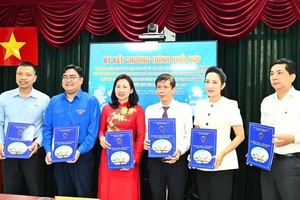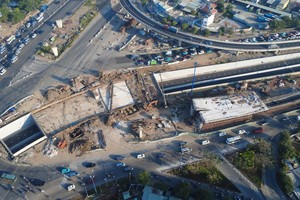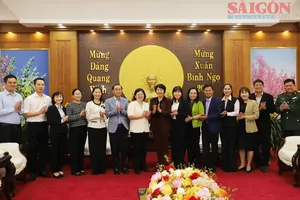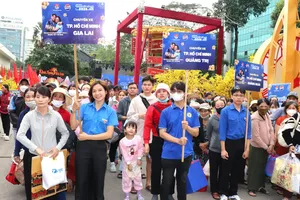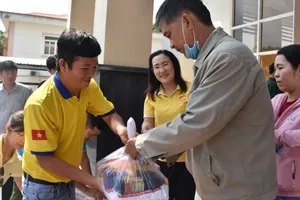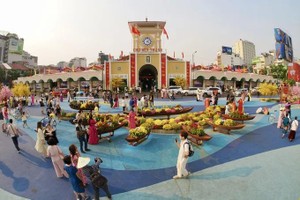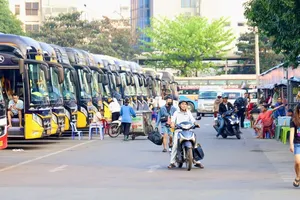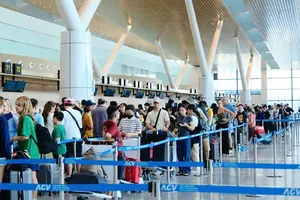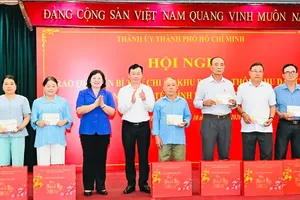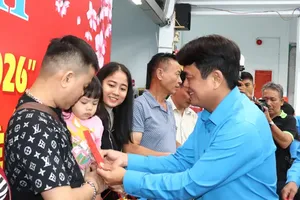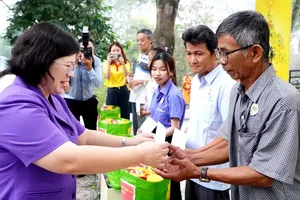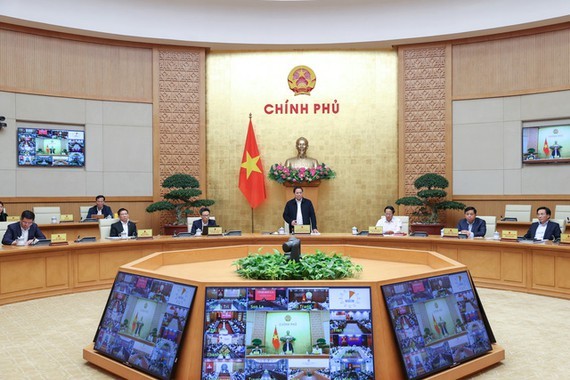 At the meeting
At the meeting
Mr. Mai made the statement at an online conference on the social-economic recovery and development program, the allocation and disbursement of public investment capital, and the implementation of important national transport works chaired by Prime Minister Pham Minh Chinh on April 5.
Speaking at the conference, Chairman of Ho Chi Minh City People's Committee Phan Van Mai highly appreciated the directions of the Government, the Prime Minister, and deputy prime ministers. Ho Chi Minh City will be more determined in the implementation of infrastructure projects.
The country’s social-economic growth in the first quarter was very positive, in that context, the southern metropolis’s socio-economic situation also prospered. Ho Chi Minh City's first-quarter growth rate reached 1.88 percent with the budget revenue reached 31.3 percent of the yearly estimate.
Chairman of Ho Chi Minh City People's Committee Phan Van Mai pointed out three reasons generating Ho Chi Minh City's socio-economic strong recovery. Firstly, the implementation of the resolutions of the National Assembly and the Government on the socio-economic recovery program and the action programs of the ministries and agencies have been promptly and synchronously carried out resulting in a positive impact on the city’s fast recovery and development.
Secondly, the People's Committee of Ho Chi Minh City, all departments, and the entire state machinery are drastically and synchronously determined in management.
Thirdly, the dynamism and determination to overcome difficulties of the business community and city dwellers are important factors for the city’s development.
However, the southern metropolis also has difficulties and limitations such as falling retail sales and consumer services, showing that purchasing power has not fully recovered. Noticeably, the average consumption index doubled over the same period.
The city has seen a decrease in FDI attraction as well as new businesses’ registration capital. This required a careful review of issues relating to the business environment, solutions, and conditions for attracting new investment, both domestic and FDI enterprises.
Some key industries such as electronics, construction, or some important service industries such as tourism still recovered slowly, not reaching the threshold before the epidemic.
Disbursement of public investment in Ho Chi Minh City is in the low group of the country because the city implements the public investment plan in 2022 slowly. City authorities ought to accelerate the disbursement of state-invested projects.
The planning work, including the general planning of Ho Chi Minh City and the planning of Thu Duc city, is also slow.
In the second quarter, Ho Chi Minh City will focus on key tasks including Covid-19 control, solutions for existing problems, acceleration of digital transformation and IT adoption, solutions to develop tourism, solutions to stabilize market prices, and logistic development.
The city firstly will control the epidemic to prevent the outbreak along with continuing to improve the capacity of the health system, especially at grassroots medical facilities with a focus on vaccination, especially for children from 5 to 11 years old.
Secondly, the city will look for solutions to overcome the limitations with a focus on supporting key industries such as electronics, construction, and tourism development and solutions for socio-economic recovery and development of Ho Chi Minh City, including implementing fiscal and monetary packages, as well as remove difficulties to help businesses people.
Next, the city will promote the application of information technology and digital transformation, find solutions to develop tourism, develop the logistics sector, and implement solutions to stabilize market prices, ensuring price stability.
Regarding social development, Ho Chi Minh City will implement a social security strategy such as a housing program, mental health care after Covid-19, and a care program for vulnerable people.
Ho Chi Minh City assessed that with the coming inflation and price instability, especially after Covid-19, vulnerable populations including the economically disadvantaged, racial and ethnic minorities, the uninsured, low-income children, the elderly, the homeless, those with human immunodeficiency virus (HIV), and those with other chronic health conditions, including severe mental illness will certainly increase.
Along with that, Ho Chi Minh City focuses on infrastructure projects such as completing the Ring Road 3 dossier to submit to the National Assembly in May and completion of the dossier on the Ho Chi Minh City - Moc Bai expressway to submit to the competent authorities in the second quarter. Additionally, the city will accelerate the progress of urban railway Metro No. 1 for trial operation at the end of 2022 and commercial operation in 2023.
Last but not least, in the second quarter, the city will submit to the Prime Minister the task of planning at the provincial level of Ho Chi Minh City, the general planning dossier of Thu Duc city; Approving the general planning of Thu Duc city, bidding for a consultant to make the general planning of Ho Chi Minh City.
The Chairman of the municipal People's Committee emphasized that recently, the coordination between Ho Chi Minh City and ministries has been very good. Therefore, he hoped that in the coming time the city will be supported by ministries and responsible agencies to remove difficulties and speed up work progress. Regarding public investment, Ho Chi Minh City authorities have assigned responsibilities to heads of sectors, and chairpersons of people's committees of districts and investors, while investors should verify plan progress, and identify focus and obstacles for timely resolution.
In addition, from April, Ho Chi Minh City will conduct monthly public investment meetings to promptly remove obstacles, including briefings with donors, investors, and ODA projects.
Ho Chi Minh City will review and adjust the public investment plan to submit to the People's Council of the city as well as prepare a dossier to request the central government to adjust the medium-term public investment ceiling for HCMC.

